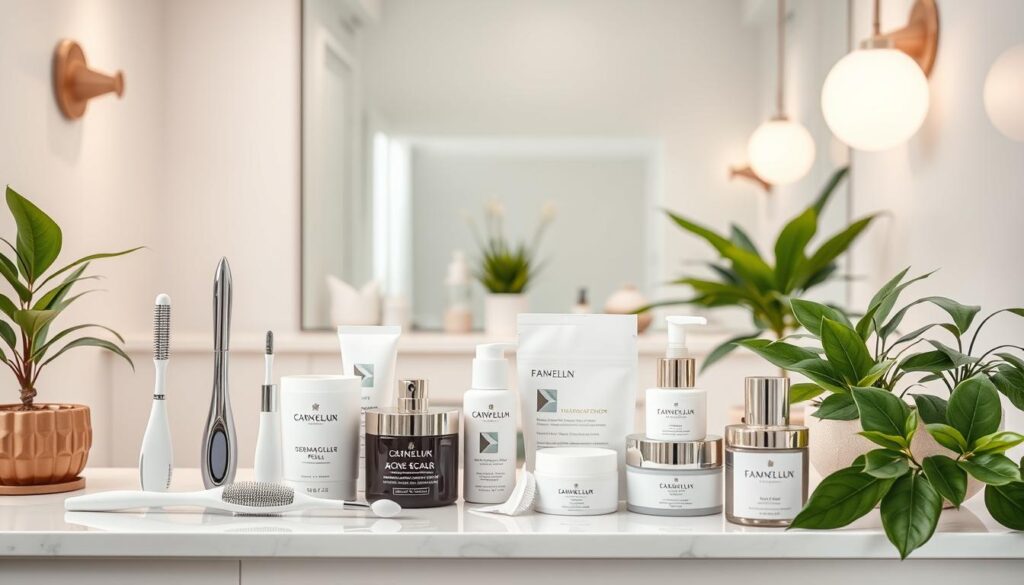Acne scars can be tough to handle. Many people face this common skin issue. Learning about treatment options is key to achieving smoother skin1.
Different treatments work for various skin types. That’s why personalized care is so important1. There’s no one-size-fits-all fix for acne scars.
Your path to better skin involves trying different methods. From creams to professional treatments, you have many choices2. Each can help reduce the look of scars.
Skin experts suggest a well-rounded approach. Fillers, laser treatments, and skin needling can all help1. Some results are short-term and need repeat sessions1.
Key Takeaways
- Acne scar treatments vary based on individual skin type and scar severity
- Multiple treatment options exist, from topical solutions to professional procedures
- Consultation with a dermatologist is crucial for personalized treatment
- Some treatments provide temporary results and may require repeat sessions
- Combining different approaches often yields the best outcomes
Understanding Acne Scars and Their Types
Acne scars can be a frustrating reminder of past skin struggles. They tell a unique story of your skin’s healing journey. Understanding acne scarring is key for effective prevention and reduction strategies.
What Causes Acne Scars?
Acne scars form when your skin experiences deep tissue damage during breakouts. Severe or improperly treated acne can trigger permanent skin changes. Most people will encounter at least a few acne scars in their lifetime.
Types of Acne Scars Explained
Acne scars come in various shapes and depths. Here are the primary types:
- Ice Pick Scars: Narrow, deep scars that look like small puncture marks3
- Rolling Scars: Wide and shallow, creating a wavy skin texture3
- Boxcar Scars: Round or oval depressions with defined edges3
- Hypertrophic Scars: Raised scars that develop after acne clears3
The Impact of Skin Type on Scarring
Your skin tone plays a big role in scar formation and treatment. Darker skin tones are more prone to raised acne scars. They also experience post-inflammatory hyperpigmentation more often.
These pigmentation changes can appear red, pink, brown, or bluish-gray. The color depends on your specific skin tone.
Remember, not all skin marks are permanent. With proper care and professional guidance, you can minimize the appearance of acne scars.
For personalized acne scar reduction strategies, consult a board-certified dermatologist. They can provide targeted treatments tailored to your unique skin needs3.
Effective Treatments for Acne Scars
Acne scars can be tough to handle. But don’t worry! There are many ways to help smooth your skin. Let’s explore some effective treatments that can make a real difference.
Topical Treatments You Should Consider
Acne Scar Creams can work wonders for your skin. Retinoids and alpha hydroxy acids (AHAs) are powerful ingredients to look for. These can help improve your skin’s texture.
Atrophic scars affect most people with acne scarring. Here are some key ingredients to consider:
- Salicylic acid (30% concentration)
- Glycolic acid peels (5-70% strength)
- Retinoid-based treatments
Professional Procedures: What to Expect
For tougher scars, professional treatments offer advanced solutions. Lasers, especially fractional ones, are top-notch for improving acne scars4. Here are some key professional options:
| Treatment | Effectiveness |
|---|---|
| Laser Resurfacing | High effectiveness for boxcar and rolling scars |
| Microneedling | Reduces scar depression |
| Chemical Peels | Improves various scarring types |
At-Home Remedies for Mild Scarring
For mild Acne Scar Remedies, try these at-home treatments:
- Regular exfoliation with gentle chemical exfoliants
- Consistent use of sunscreen to prevent further discoloration
- Hydration and gentle skincare routine
Remember, patience is key when treating acne scars. Results take time and consistency.
Consult a dermatologist to determine the most suitable treatment for your specific skin type and scar characteristics.
Maintaining Healthy Skin Post-Treatment
Successful acne scar reduction demands ongoing skincare commitment. Your post-treatment care is vital for preventing new scars. About 20% of people face acne scars, so you’re not alone.
Sun protection is key for acne scar prevention. Chronic stress can hinder skin healing and cause hormonal imbalances. Aim for 7-9 hours of sleep nightly to support skin repair.
Your lifestyle greatly impacts acne scar reduction. Peptides can boost collagen production, enhancing skin resilience. Managing stress and eating well can help prevent scarring.
Avoid picking at your skin and use gentle cleansers. Consult a dermatologist for personalized advice on your skin care routine567.
FAQ
What causes acne scars to form?
What are the different types of acne scars?
How can I prevent acne scars from forming?
What topical treatments work best for acne scars?
Are professional treatments more effective than at-home remedies?
How important is sun protection in treating acne scars?
Can diet and lifestyle affect acne scarring?
When should I consult a dermatologist about my acne scars?
Source Links
- Acne scars: What’s the best treatment? – https://www.mayoclinic.org/diseases-conditions/acne/expert-answers/acne-scars/faq-20058101
- Acne scars: Consultation and treatment – https://www.aad.org/public/diseases/acne/derm-treat/scars/treatment
- Acne scars: Signs and symptoms – https://www.aad.org/public/diseases/acne/derm-treat/scars/symptoms
- What Is the Most Effective Treatment for Acne Scars? | Essential Dermatology – https://www.essential-derm.com/what-is-the-most-effective-treatment-for-acne-scars/
- Acne is Bad Enough. Get the Information You Need to Find the Right Treatment for Skin Damage and Scars. – https://www.webmd.com/skin-problems-and-treatments/acne/guide-to-treating-acne-scars-and-skin-damage
- How Do You Maintain Your Skin After Acne Treatment? – trilogymedicalcenter.com – https://trilogymedicalcenter.com/how-do-you-maintain-your-skin-after-acne-treatment/
- Eternal Dermatology & Aesthetic Center – https://www.eternaldermatology.com/say-farewell-to-acne-scars-a-guide-to-effective-treatments/
